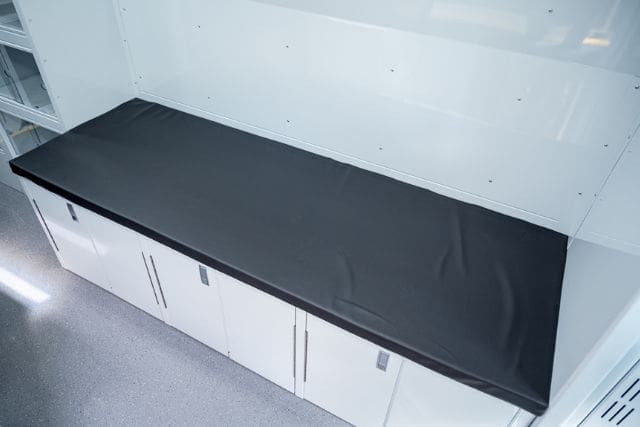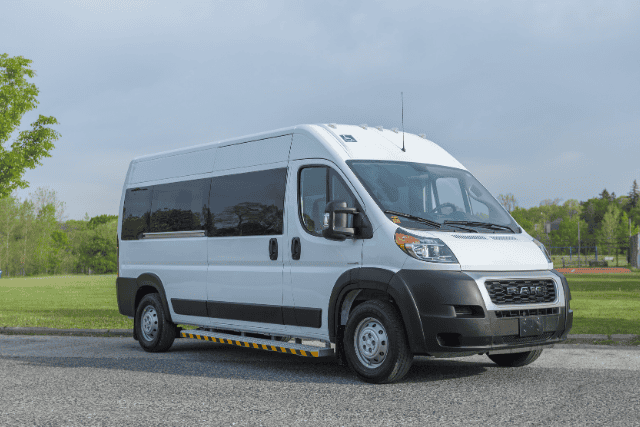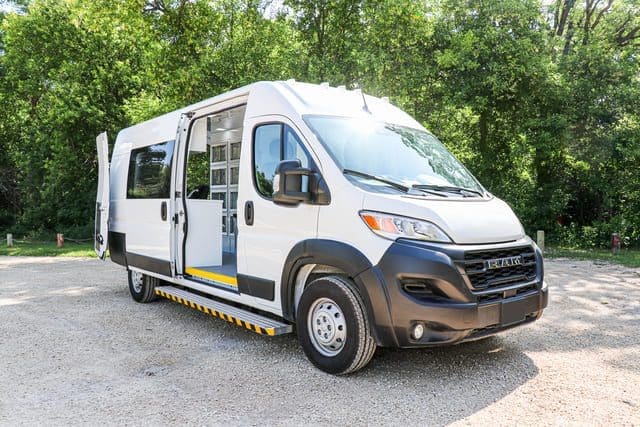Ever thought about how much the right mobile clinic beds matter when running a mobile medical program? Picture this: Your mobile clinic is ready to provide healthcare, but the beds inside don’t fit your healthcare team’s needs. Patients are uncomfortable, providers are frustrated, and the whole system feels harder than it should. That’s a big problem—one that can impact how well your clinic serves the community.
But here’s the good news: you’ve got options. Choosing the right mobile clinic beds can make everything run smoother—patients feel cared for, staff work more efficiently, and your clinic meets its goals.
At AVAN Mobility, we’ve spent over 10 years designing vehicles that remove barriers to healthcare. We know how important it is to get the details right—like which beds work best for mobile clinics. Take a look at the exam bed in one of our past clients’ mobile clinics, the Community Clinic of Southwest Missouri.
In this article, we’ll take a closer look at mobile clinic beds, what to think about before choosing one, and how the right bed can make a real difference. Let’s get started!
Mobile clinic beds: what types are most commonly used?
Choosing the right bed for your mobile clinic is a big deal. It’s about finding something that works for your patients, your team, and the type of care you provide. Let’s look at the most common options:
Basic exam beds are the go-to choice for most mobile clinics. They’re simple and practical and often come with storage underneath for tools and supplies. They’re perfect for general exams and saving space.
Brewer exam tables: Do you need something with more bells and whistles? Brewer exam tables are ideal for clinics offering in-depth examinations. They often include adjustable features and extra functionality to make exams easier and more comfortable.
Specialized exam chairs: Some organizations swap out beds entirely for exam chairs. These are customized for specific types of care, like dental or gynecological exams. They’re a great fit when your clinic has a focused specialty.
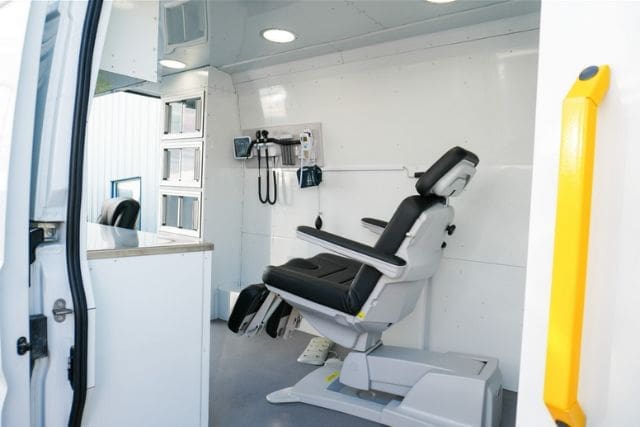
The bottom line: The type of bed you choose depends on the kind of care you provide. A simple exam bed or a specialized chair can have a big impact on the operation of your mobile clinic. Having the right setup makes a huge difference in how effectively your services are delivered.
What should you consider before choosing a mobile clinic bed?
Picking the right bed for your mobile clinic is about finding a solution that fits your unique needs.
Here’s what to think about:
Type of examinations: What kind of care will you provide? If you’re doing general exams, a basic bed will work. But if you need access to specific parts of the body for specialized care, you’ll want a bed designed for that.
Primary and secondary uses: Think beyond the main purpose of the bed.
- Will it be used for more than just exams?
- Maybe for patient recovery or to store things underneath?
Make sure it can handle multiple tasks if needed.
Accessibility: If your clinic serves wheelchair users or patients with mobility challenges, accessibility is key. Look for beds that adjust in height or offer features like side rails to make getting on and off easier.
Quick tip: Always think about your patients and staff. The right bed should make their experience as smooth and stress-free as possible. A little planning now can save you big headaches later!
What types of beds work best for different mobile clinics?
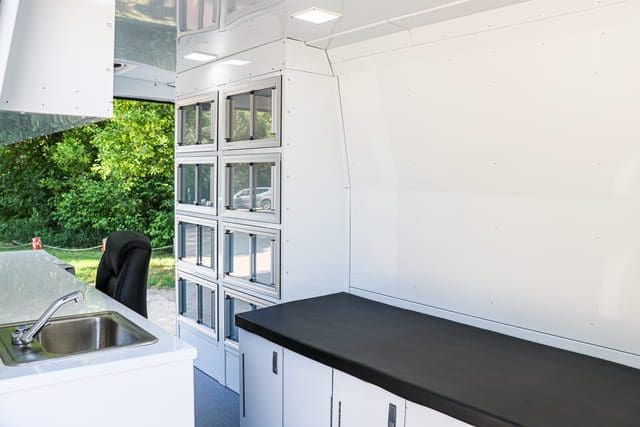
Different mobile clinics have unique needs, and the type of bed you choose plays a big role in delivering the best care. Here’s a closer look at common setups and the beds that suit them.
OBGYN units: beds with stirrups for pelvic exams
Beds with stirrups are the best bet if you’re running a mobile OBGYN clinic. These beds are designed to make pelvic exams easier for both patients and providers. They allow doctors to perform necessary exams while ensuring patient comfort and dignity.
Example: An OBGYN mobile unit serving rural communities might use adjustable beds with built-in stirrups to accommodate patients of varying needs. This setup helps ensure patients feel at ease, even in a compact mobile clinic setting.
Phlebotomy units: chairs with padded armrests
Phlebotomy units focus on drawing blood, so the bed—or, in this case, the chair—needs to support that process. Chairs with padded armrests are ideal. They provide comfort for patients while keeping their arms steady for precise blood draws.
Example: A blood donation clinic on wheels might use padded chairs with adjustable armrests to streamline the process for donors. These chairs make it easier for staff to access veins and ensure a smooth experience for patients.
Mobile primary care: simple beds with storage
Mobile primary care clinics often stick to the basics. A simple exam bed with storage underneath is a practical choice. It’s versatile enough for general check-ups while saving space by holding instruments and supplies.
Example: A mobile clinic offering routine check-ups and vaccinations may choose these beds to make the most of limited space. Staff can store medical tools directly beneath the bed, keeping everything within arm’s reach during patient care.
Matching the bed to your clinic’s purpose can make all the difference. Whether it’s stirrups for specialized care or padded armrests for comfort, the right choice ensures smoother operations and better outcomes for patients. Think about what your team needs most and go from there!
Want to learn more about mobile clinic beds?
When you first came to this article, you were likely searching for answers about what type of mobile clinic beds would work best for your setup. Maybe you were unsure of the options or didn’t know where to start.
Now, you’ve got a better understanding of the types of beds available—basic exam beds, Brewer tables, and specialized chairs—and the features to consider, like accessibility, storage, and how the bed aligns with your clinic’s specific care needs. You’ve learned how the right bed can make a real difference in patient comfort and operational efficiency.
Our team at AVAN Mobility knows how much thought and care goes into setting up a mobile clinic, and we’re here to make that process easier. Our commitment is about helping your organization remove barriers to care and empowering your team to make a real impact in your community. If you ever have questions, we’re always here to help. Just click the button below to speak with one of our mobility experts.
If you’re not ready to talk to someone yet, that’s fine. We have a few other resources that’ll help answer more of your questions.
Check out our three-part video series on mobile clinics and use some of this information to guide you along the process.
FAQ
Q: Are there adjustable beds in mobile clinics?
A: Yes, your Mobile Clinic Specialist can help you choose a bed with the right level of adjustability for your needs. Options include height adjustments, tilting features, and specialized designs for patient care.
Q: How is a bed securely installed to prevent movement during travel?
A: Beds in mobile clinics are either incorporated into the vehicle’s frame or securely bolted to the floor. This ensures stability and safety while the clinic is on the move.
Q: Can a mobile clinic bed be customized for specific medical specialties?
A: Absolutely! Beds can be tailored for specialties like OBGYN, phlebotomy, or dental care, with features such as stirrups, armrests, or reclining functions. Speak with your specialist to find the perfect fit.
Q: Are mobile clinic beds easy to clean and maintain?
A: Yes, most beds are designed with smooth, wipeable surfaces and minimal seams to make cleaning quick and thorough. This is important for maintaining hygiene in a healthcare setting.
Q: Is there storage space underneath exam beds in mobile clinics?
A: Yes, AVAN Mobility’s exam beds include ample storage compartments underneath. This helps keep essential tools and supplies organized and within easy reach during patient care.
